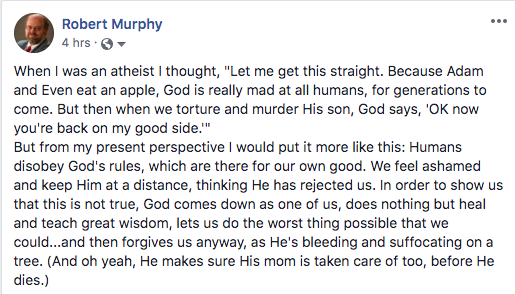The Garden of Eden and Original Sin
Here are two standard critiques of Christianity:
- Why does a good God allow evil?
- The doctrine of “original sin” is monstrous–how can the actions of Adam and Eve possibly affect the “nature” of their descendants?
The other day an idea popped into my head (I would say God gave it to me but I realize opinions may vary) that seems to solve both problems in a very elegant and satisfying way.
First, let’s review what actually happened in the Garden (Genesis 1: 15):
15 Then the Lord God took [d]the man and put him in the garden of Eden to [e]tend and keep it. 16 And the Lord God commanded the man, saying, “Of every tree of the garden you may freely eat; 17 but of the tree of the knowledge of good and evil you shall not eat, for in the day that you eat of it you[f] shall surely die.”
Now in the Garden, life was bliss. There was no suffering. Adam and Eve had childlike innocence.
But they wanted to possess the knowledge of good and evil. So they ate of the fruit that bestowed it.
Now–and here’s the part that just occurred to me the other day, even though it’s pretty obvious–suppose that in order for a human to truly understand evil, you have to experience it? And I don’t just mean you have to suffer at the hands of evil, but you have to be in its grip?
Then everything else would follow. God allows evil in the world, and indeed the fundamental nature of humans born since that fateful decision has been in bondage to sin (but still with the remnant of the divine origin).
God would have preferred that this didn’t happen. He explicitly warned them, “If you seek that knowledge, it will kill you.” But they disobeyed Him, they chose the knowledge of good and evil, and so He gave it to them.
Even so, God designed the structure of the universe such that DESPITE their disobedience, He could still achieve humanity’s salvation. So now humans definitely understand evil, but they also have been rescued from it by Jesus.
What’s wrong with this explanation? I realize it seems pretty basic but it almost knocked me over when it first occurred to me.
Rothbard on the “Sustained Sneer”
Ryan Griggs alerted me to this footnote in Rothbard’s Man, Economy, and State (p. 975 of the Scholar’s Edition)in which he describes Galbraith’s rhetorical style when dealing with opponents:
92 Galbraith’s major rhetorical device may be called “the sustained sneer,” which includes (a ) presenting an opposing argument so sardonically as to make it seem patently absurd, with no need for reasoned refutation; (b ) coining and reiterating Veblenesque names of disparagement, e.g., “the conventional wisdom”; and (c ) ridiculing the opposition further by psychological ad hominem attacks, i.e., accusing opponents of having a psychological vested interest in their absurd doctrines—this mode of attack being now more fashionable than older accusations of economic venality. The “conventional wisdom” encompasses just about everything with which Galbraith disagrees.
As Ryan asks, sounds familiar doesn’t it…?
Bob Murphy Show ep. 29: No, Ilhan Omar Wasn’t Taken Out of Context
My latest episode.
As I mention in the beginning, this Friday (April 26) I’ll be at Connecticut College talking about the economics of climate change.
On Monday (April 29) I’ll be at Lock Haven University talking about free-market health care. (That link will have my details after they have their Nigel Farage event.)
Both are open to the public.
Thoughts on Christianity
I am sure I’ve said something like this on the blog before, but here’s what I posted on Facebook today…

Bohm-Bawerk’s Own Theory of Interest
In ep. 28 of the Bob Murphy Show, I lay out Bohm-Bawerk’s own theory of interest.
Potpourri
==> Nelson Nash died in late March. This issue of Bank Notes has some tributes to him, including mine. (In the new Lara-Murphy Report [sub required] I have a longer one.)
==> In the latest Contra Krugman we talk about Krugman going after Stephen Moore. I thought Krugman’s crack about Freedom Fest was pretty low, tell me if you agree.
==> In related news, David R. Henderson has a good piece on the Moore nomination, specifically his gentle yet firm (that makes sense right?) pushback on Mankiw. (Note: Of course I disagree with David about Scott Sumner.)
==> History was made yesterday on Twitter.
A Testimony on Becoming Christian
I don’t think I already shared this? Anyway, BraveTheWorld has shared her experience of going from intellectual atheist to Christian. It interests me because I had a similar journey.
I am curious about which (if any) of her points resonate with people, because at some point I’ll devote a podcast episode to this topic (in my case).
A Strident Yet Funny Take on Assange
I really liked this provocative video. I clicked on some of their/her other stuff, and it’s a bit fuzzy. (E.g. they don’t seem to really know the difference between wealth and income.)
Also, on the claim that the IMF money was tied to Assange, here is Jason Ditz.







Recent Comments